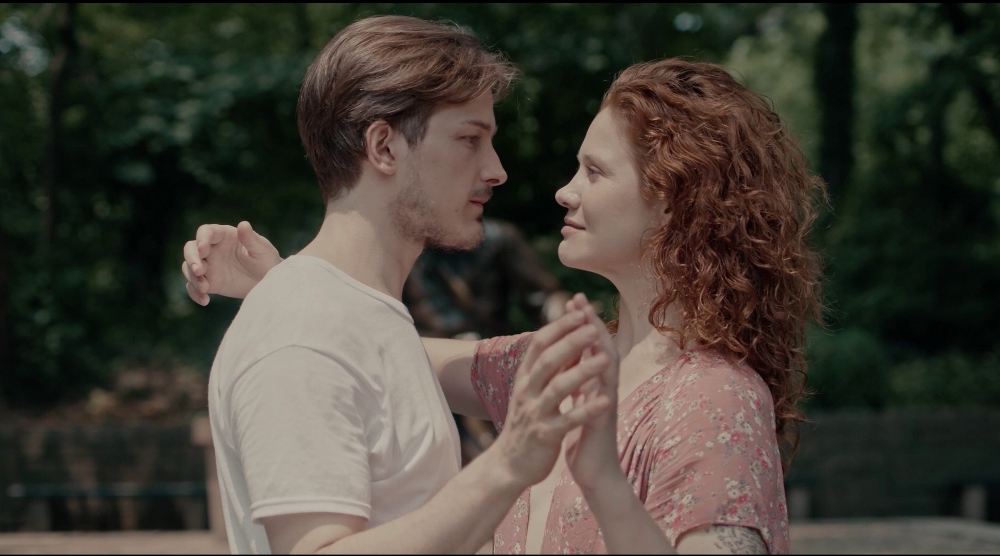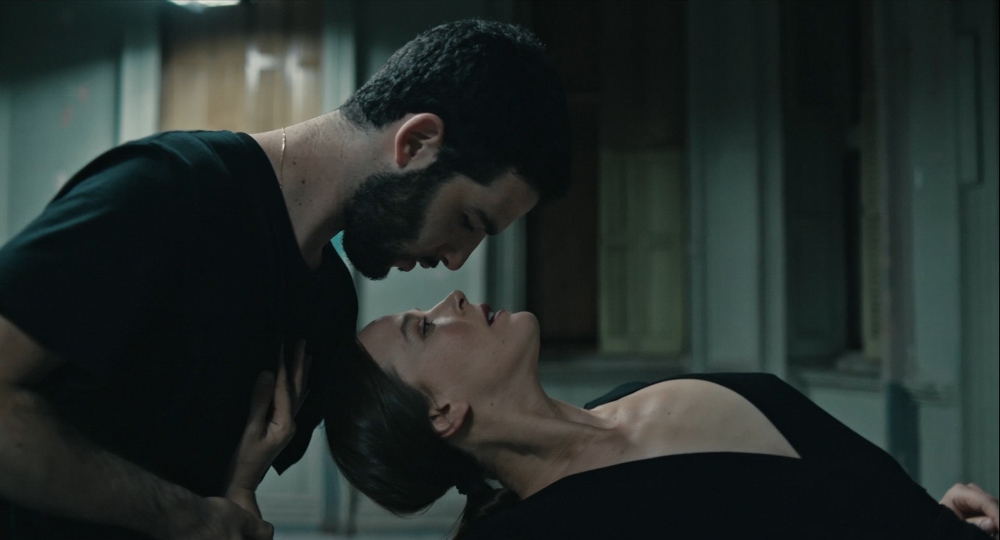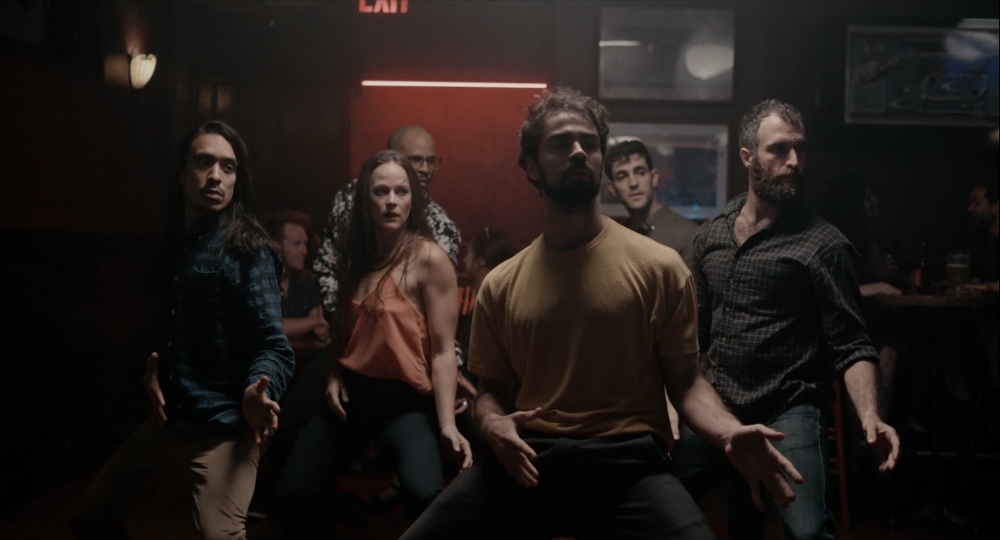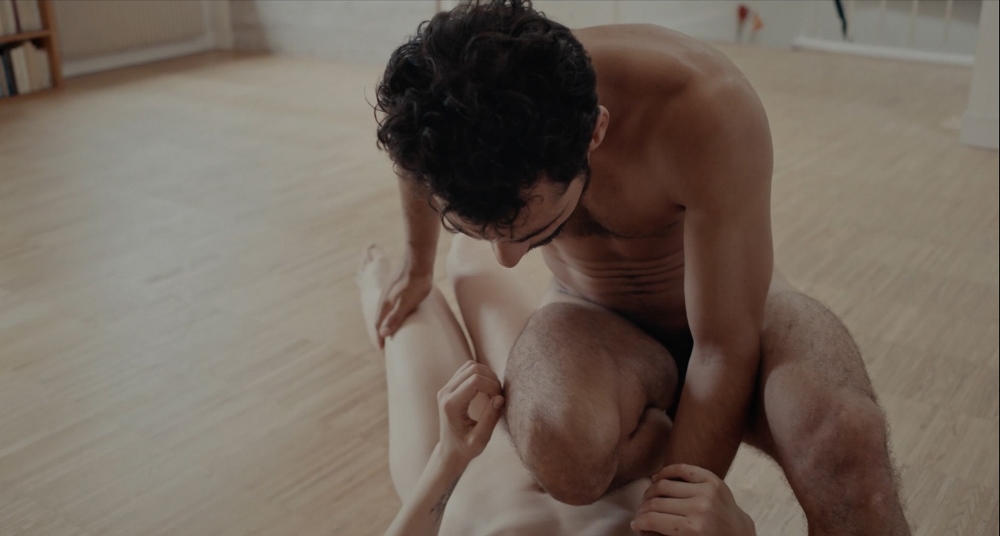
The best magic tricks are the ones that let you know exactly what they are doing, yet still leave you full of wonder. In his new film Aviva, Boaz Yakin rips out the fourth wall in the first scene, shows us the cameras and tells us exactly what he plans to do. Or rather, Bobbi Jene Smith, choreographer and co-producer with Yakin, reclining nude, clues in the viewers, letting us know that she is an actress, portraying a man, speaking words that were written by “what we as a species commonly refer to as a man.” We are also informed that dancers were cast in the film because it was deemed “more viable for the dancers to pull off the acting required then vice versa.” Perversely, because Aviva does not request or require my willing suspension of disbelief, I am utterly drawn in by its compelling visual storytelling.

Exploring issues of love, relationships, gender, and identity, the film follows the romance of Aviva (Zina Zinchenko) and Eden (Tyler Phillips), but with a twist: both characters are double cast, with Or Schraiber also portraying what might be considered the male aspect of Aviva, and Bobbi Jene Smith as Eden’s female self. Confused? It sounds a lot more complicated than it plays out, and that is the film’s strength. Externalizing the characters’ internal split into male and female actors renders the concept very easy to contemplate: it’s there, we can literally see it in action. While sorting out the interactions of this couple/foursome did become a bit confusing for me in the latter part of the film, wondering at one point – so, are they together or not? – the connection to the characters’ emotional journey is always strong. Calling into question the conventions of film and gender definitions, Yakin deftly avoids the overly cerebral, embracing imagery and movement to convey feelings and relationships.
Embodying the inner workings of the protagonists’ psyches as characters in the film emphasizes the connection between mind and body, a theme that is explored throughout the film as bodies, in their different expressions, convey as much, and often more, than the spoken dialogues of the screenplay. The film sets the tone from the beginning with the blunt full-frontal nudity of several characters (including an elderly lawyer) as they stand still, looking directly at the camera, as if to say – yes, this is me, stripped naked, bare of adornment or artifice, you may be attracted, you may be repelled, but this is me; brave, vulnerable. Although there are always infinite invisible layers of concealment, and neither a relationship nor the psyche of a character can really be stripped naked to reveal all its inner workings, Yakin’s bold experiment offers a captivating and thought-provoking perspective.
Aviva and Eden’s relationship with one another and with their other selves plays out in sensual abundance, with dance and sex scenes that are at once brilliantly staged and feel utterly natural. Bobbi Jene Smith’s choreography, with Or Schraiber as co-choreographer, is outstanding. The dance scenes are riveting, they dazzle and imbue the film with a depth and intensity that reaches far beyond words. Wild, delicate, sinuous, supple, precise, and surging with energy the dancers (several of them formerly of the Batsheva Dance Company) are enthralling, making this a must-see film for dance enthusiasts.

When Eden feels the need for a night out with the guys, it is Bobbi Jene that takes over. The muscular camaraderie, rough humor, competitiveness and sensuality of male friendships anointed by beer dances in all its playful exuberance. There is intelligence and humor in the choreography, as when the men see an attractive woman at the bar and the dance immediately becomes a unison expression of desire and pursuit; or in Bobbi Jene’s stand-out comic depiction of a journey from New York to LA. The protagonists are not only connected to their male and female aspects, but the child within is ever-present. Although the adult Eden is rather on the morose side, watching the kid inside dance with his friends on the subway, fellow travelers riding on the wave of their enthusiasm, not only made this writer want to get up and dance too, but opened my heart up to the character.

The dance scenes – from the eloquently sensual duet of Aviva (Zina Zinchenko) and former lover Philippe (Isaias Santamaria), to the exuberant wedding scene with Aviva (Zinchenko) and Eden (Bobbi Jene Smith) at its exultant heart, and many more – are breath-taking and exquisitely beautiful. Conveying the nuances of Aviva and Eden’s relationship from the first bright tones of email banter, to the more complex hues of the relationship, the imagery and movement create a wonderful flow. Although Aviva and Eden’s relationship is at the center, some of the film’s most intriguing and poignant moments take place between Eden/Tyler and Eden/Bobbi Jene, or Aviva/Zina and Aviva/Or. Aviva is an invitation to consider not only the fragmentation and fluidity of gender, but of the psyche.
Aviva will participate in the Carmel International Competition at the 36th Haifa International Film Festival, which will take place online from October 3 – 10, 2020. The full schedule and ticket information will be available on the festival website: https://www.haifaff.co.il/eng
Aviva
USA|France 2020 115 min. | English | Hebrew subtitles
Directed by Boaz Yakin; Producers: Carlos Zozoya, Boaz Yakin, Bobbi Jene Smith; Screenplay: Boaz Yakin; DP: Arseni Khatchaturan; Editor: Holle Singer; Music: Asaf Avidan; Cast: Zina Zinchenko, Bobbi Jene Smith, Tyler Phillips, Or Schraiber





